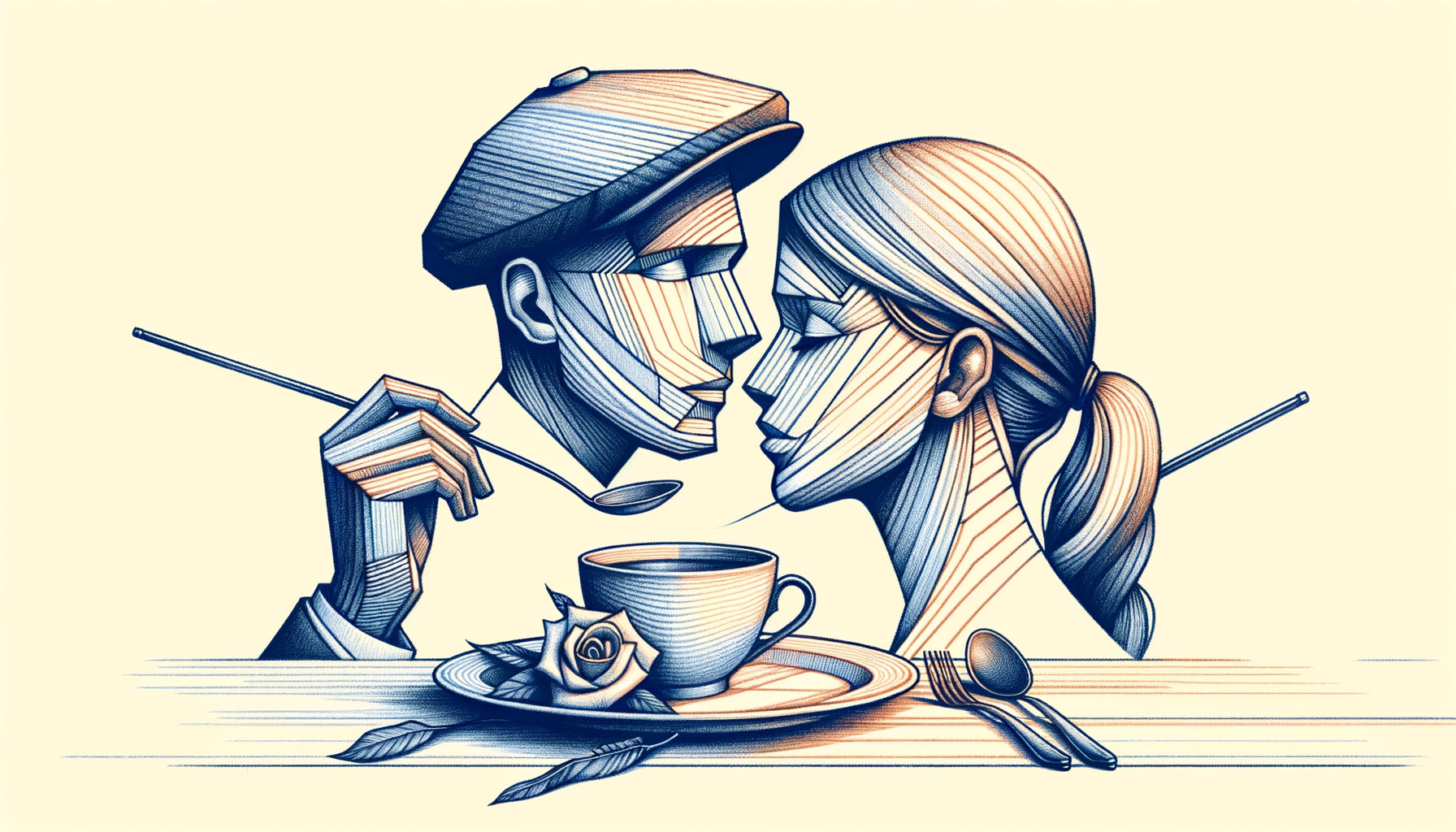Growing up in the sun-drenched vines of Napa Valley, my family had its own romantic mythology. We didn’t quite believe in fairy tales or pots of gold at the end of the rainbow, but we had something we clung to with the same level of starry-eyed devotion: the belief that "everything important happens around the dinner table."
To hear my parents tell it, massive decisions and deep revelations unfolded over candlelit meals. The secrets of the universe emerged between bottles of Tempranillo and perfectly chilled Chablis. I grew up watching them host dinner parties where disputes were settled over the last slice of tarte Tatin and friendships were bonded through shared flights of Merlot. It was a world that made raw intimacy feel as natural as pairing duck with Pinot Noir.
This belief shaped me. I learned to look for someone who could conquer conversation like the perfect amuse-bouche: a little humor, a pinch of depth, and an ability to leave you wanting more. But as I got older, I started to notice cracks in that rosy family philosophy. Not everything important—or, honestly, anything really important—was resolved between bites of farm-to-table perfection. And more than that, sometimes the dinner table was a place of its own chaos.
Myth #1: Dinnertime Is Sacred; Therefore, Relationships Are Too
One of the core messages behind my family's food-centric doctrine was that dining together was the glue holding relationships in place. If you couldn’t savor life together over a slow-roasted pork loin, did you even have a meaningful connection?
But if you’ve ever set up an ambitious wine and cheese night for date three, only to watch the entire thing go sideways because Camembert doesn’t pair well with awkward silences, you’ll know the truth: sharing meals doesn’t instantly bond people. It’s not a shortcut to intimacy—it’s a backdrop. Once, I spent six hours prepping a duck confit for a guy who casually said, as I was pulling the bird from the oven, “Oh, actually, I don’t really eat duck.” (A statement that felt, in the moment, like a rejection of me personally.)
I’ve also survived the rollercoaster of early dates where you split an artfully plated beet salad, engage in surface-level banter, and leave not feeling any closer to the other person than you were before deciding who was picking up the check. Food can set the stage, but the actors have to bring their own scripts.
Myth #2: Arguments Are Resolved with Homemade Dessert
Here’s the thing about sitting around a table: You’re sitting. Not storming out. Not slamming a car door or swirling dramatically away on your heels after saying, “Well, I guess this is goodbye.” (What can I say? I’ve marathoned too many rom-coms.) My parents pushed the idea that no argument could withstand the clarifying power of crème brûlée caramelized to crackling perfection. But arguments over food don’t always go that way. Sometimes, they just linger there—awkward and half-finished, like a bottle of wine gone corked.
One of the most uncomfortable stalemates I’ve ever experienced was at a multi-course dinner with a partner I’d been with for six months. We’d hit this murky, unspoken intersection where we both knew some Big Conversations needed to happen, but neither of us knew how to start them. Instead, we ended up eating ravioli in near silence, tolerating the tension as the server sprinkled Parmesan cheese over our awkwardness. I spent the whole night trying to interpret the unspoken: Did the pasta mean everything was fine? Was the way he asked for sparkling water a signal? Spoiler: It wasn’t fine.
Here’s a hard truth I wish someone had warned me about: food doesn’t automatically soften emotional edges. The meal can end, but the tension can leave a bitter aftertaste.
Myth #3: Fancy Meals Mean True Romance
My parents’ culinary upbringing gave them a somewhat... aspirational approach to love. They once told me that when they were first dating, they saved every dime to splurge on tasting menus with 12 courses, even if it meant they couldn’t pay for anything else during the week. That kind of romantic theater is iconic when you’re young and sweeping each other off your feet, but as I've navigated relationships in my own life, I’ve realized there’s a fine line between indulgence and distraction.
A plate of lobster risotto in a Michelin-starred restaurant doesn’t necessarily mean your date gets you. It might mean they’re trying to dazzle you—or distract from the fact that they never text back on time (glares in personal experience). My parents’ belief that big food moments meant big feelings set me up for failed expectations. I later learned some of the best dates of my love life happened over greasy pizza eaten cross-legged on the couch while arguing about which version of “Pride & Prejudice” reigns supreme. (It’s Colin Firth. Always.)
What I discovered is this: Romance doesn’t need a tasting spoon. It needs presence.
Myth #4: Your Soulmate Is the One Who Matches Your Palate
If I had a dollar for every time my mom said, “You’ll know they’re the one when the two of you agree on wine,” I’d have enough to buy a decent bottle of Sauvignon Blanc. But here’s the thing—I’ve dated people who can identify specific tasting notes in a Zinfandel yet can’t express basic feelings of affection. Turns out, just because someone appreciates a nutty Gruyère doesn’t mean they’ll be emotionally available.
Now, I think of shared taste as a fun bonus, not a soul-bonding prophecy. When I met someone who thought Riesling was “too sweet” but could make me laugh until I cried, I realized this neat formula I’d inherited had a fatal flaw: People are more than a collection of palate preferences. A relationship will not crumble if one of you likes steak rare and the other prefers theirs well-done. (Okay, maybe there’s a little judgment on that last part.)
What You Should Take Away
Relationships cannot live on bread or Bolognese alone. My family’s dinner table myth was charming in its way, but it also made me fall into the trap of thinking romance should follow a recipe: mix the right ingredients—wine flights, witty banter, an amuse-bouche—and voilà! You’ve cooked up the perfect connection.
But love isn’t a five-course meal, carefully plated and neatly tied with a bow at the end. It’s messy. It spills sauce on the tablecloth and sometimes burns the garlic. True intimacy comes not when you’re sharing a bottle of Burgundy, but when you’re willing to share the parts of yourself that aren’t picture-perfect.
So, while I’ll still defend the magic of a good meal, I know this: The belief that meals alone will fix everything is just that—a myth. Connection needs something stronger than a pairing menu. It needs vulnerability, effort, and maybe a little forgiveness when the soufflé falls. And once you embrace that? You’ve got yourself a recipe worth savoring.




















